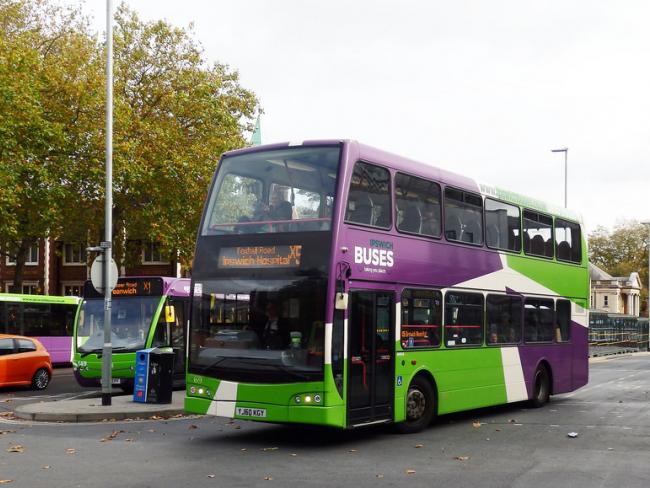5 February 2019

Ipswich Buses are one of the ten operators remaining in municipal ownership. Photo Julian Walker (CC BY-NC-ND 2.0)
Bus journeys continue to decline according to figures the government has published. This reflects increased fares and cuts in routes. And in turn this decline affects the ability of people to move around for work or leisure.
Cuts in services affect cities as well as rural routes. Local authorities blame the government and the pressure on their own budgets. The effect is corrosive. It denies mobility and opportunities for people, especially those who are poorer. It makes businesses less productive, and fragments social relations.
"Capitalists realise there is little profit in running buses."
Apart from anything else, to force people away from public transport is a way of extracting profit for the capitalists involved in cars and other private transport. The few companies now running most bus routes have discovered there isn’t much profit to be made from them, even with the privatised and subsidised arrangements which have existed for many years.
Country-wide
Department for Transport figures show that the number of bus journeys taken in Britain fell by more than 90 million between 2016-17 and 2017-18, down to 4.8 billion, continuing a downward trend.
In England just over half of all bus journeys are in London, the drop there was under 1 percent. Elsewhere bus trips were down 4.2 per cent; and in some places the fall was far greater – 24 per cent in Hertfordshire being the worst.
Scotland follows a similar pattern, down 3 per cent in 2016-17, the latest year for which figures are available. Journeys there have declined by 10 per cent over the past 5 years. In Wales the decline is a little less, at least recently, but follows the same trend.
South East and South West England are the only regions to see the number of journeys increase in the past decade. Otherwise the decline in journeys made is seen in both urban and rural areas – although the reduction in route miles is greater in the countryside.
Bus fares have risen by over 20 per cent in real terms since 2008, more in Scotland. Government subsidy has dropped since 2008, but operators’ costs have stayed relatively stable, reducing slightly since 2011-12.
Responses
Local Government Association spokesperson Martin Tett said: “Councils know how important buses are for their residents and local economies and are desperate to protect them. It's nearly impossible for councils to keep subsidising free travel while having to find billions of pounds worth of savings and protect other vital services.”
The Bus Services Act in 2017 prevented local authorities from taking back complete control of bus services. It purported to make improvements to bus services by allowing the creation of “local partnerships” and for combined authorities with mayors to partially restore regulation. It hasn’t made much difference to the problems facing passengers.
Not everyone is taking this decline lying down. A few groups of users have generated local support against bus changes making their lives a misery. And workers in the industry know that the operators will exploit them too in the face of the declining passenger numbers and falling profits.
Unite members in Durham, whose pay fight we reported in Workers, have accepted a settlement and see that as a positive step. And those working for First Arriva in West and South Yorkshire are ready to ballot to action if the company persists in its anti-union stance and disciplines two stewards.
